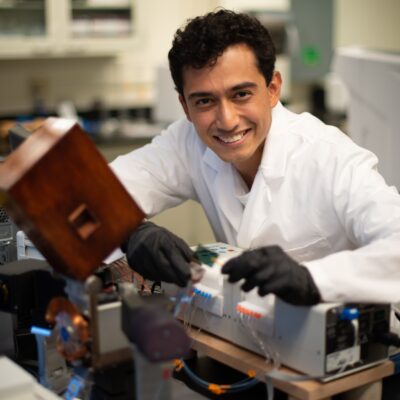Student Spotlight: Jesus Lopez Baltazar

April 22, 2024
Jesus Lopez Baltazar is a doctoral candidate in chemical engineering from Ciudad Guzmán, Jalisco, Mexico. He earned his B.S. in chemical engineering at UCLA and M.S. in chemical engineering at Cornell University and now studies the application of optical biosensors in medical diagnostics under the guidance of Qiuming Yu at Cornell.
What is your area of research and why is it important?
I work in the area of optical biosensors for applications in medical diagnostics. My research focuses on developing the surface chemistry for surface plasmon resonance (SPR) biosensors to detect and quantify extracellular vesicles (EVs). EVs are nanoscale vesicles shed by all cells and present in liquid biopsy. They inherit surface proteins from their parent cells, providing exciting opportunities for their use as diagnostic biomarkers in the mediation of several diseases. During my Ph.D., I developed immunoassays for the detection of EVs using SPR biosensors via transmembrane proteins, some of which can screen for early-stage diseases such as cancer.
What are the larger implications of this research?
Detecting protein biomarkers present on EVs has important implications in health care. Cancer, for example, is the second leading cause of death in the United States. The late screening of cancer is the primary reason for low survival rates, for which patients present late-stage metastatic tumors. Therefore, early and accurate screening is crucial to prolong survival and recovery rates in patients. EVs are crucial for the management of cancer as they play key roles in the mechanisms of intercellular communication. The detection of clinically relevant EVs using biosensors is imperative to develop diagnostic technologies that can help screen for early-stage cancer.
What does it mean to you to be a Bouchet Scholar?
Being a Bouchet Scholar is one of the greatest honors I have had at Cornell. During the first years of my Ph.D. studies, I was very fortunate to interact with several peers who became Bouchet Scholars. Witnessing their passion, drive, and commitment toward leadership and service was very inspiring, and it motivated me to walk my own journey considering their footsteps. I strongly believe the Bouchet Honor Society is a very powerful network of like-minded scholars who want to make a difference in academia. As someone who is passionate about this purpose, I could not emphasize enough how much this means to me.
How do you exemplify the five pillars of the Bouchet Society—character, leadership, advocacy, scholarship, and service?
During my Ph.D., I have been able to make significant contributions to Cornell and my department following the pillars of Dr. Bouchet. As the president of the Chemical Engineering Graduate Student Association (ChEGSA), I became a formidable student advocate, voicing the concerns of my peers to improve the graduate student experience and working diligently with department leadership to raise awareness, advocate for changes, and propose and implement solutions to help my peers, especially those navigating the paths of academia for the first time. My ongoing commitment to making improvements through service stems from a deep belief that all students should have a fair and equitable experience at Cornell.
President Pollack has designated this academic year’s theme as freedom of expression. What does freedom of expression mean to you?
I firmly believe that to establish a diverse and inclusive community, freedom of expression is one of the conditions that must be met. Intellectual diversity is key in the pursuit of academic excellence, and all perspectives should be heard (even those who we may strongly disagree with) if we want to achieve this purpose. One of the greatest virtues of this country is the First Amendment. Only when we learn to listen and respect each other’s perspectives can we develop into individuals who can contribute to society through free objective inquiry.
What are your hobbies or interests outside of your research or scholarship?
I really love photography! I developed a passion for storytelling through my camera lens during the times of the COVID-19 pandemic and have not stopped since. For me, photography unleashes inner depths of creativity. It is one of the many ways I express myself, and I believe that I am able to shine light onto hidden jewels of life through my artistic work for others to experience. One of my proudest accomplishments was having one of my photos as the cover of the 2023-2024 Cornell Planner. It is all about showing vision and perspective, and my camera lets me do just that.
Why did you choose Cornell to pursue your degree?
Cornell is truly a unique place with unmatched depth and breadth in any field of study. It is such a vibrant community. As an undergrad, I wrote the longest list of professors I was interested in to do my Ph.D. when considering Cornell. I was interested in so many research topics from nanoparticle self-assembly to polymer synthesis and plasmonic biosensors. Cornell had it all! At Cornell, I could see a place that would push me to my limits to grow both personally and academically. In the end, I am better off because of the experiences I lived on campus.
